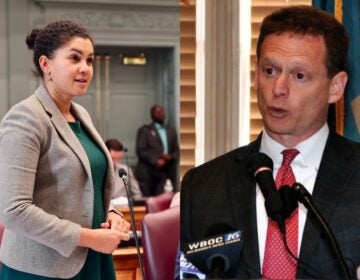Delaware unlikely to make major changes to school funding formula this legislative session
The state’s policymakers cautioned against following Pennsylvania’s lead.
Listen 1:00
File photo: Amy Lawson, a fifth-grade teacher at Silver Lake Elementary School in Middletown, Del., helps student Melody Fritz with an English language arts lesson Oct. 1, 2013. (AP Photo/Steve Ruark)
From Philly and the Pa. suburbs to South Jersey and Delaware, what would you like WHYY News to cover? Let us know!
This story was supported by a statehouse coverage grant from the Corporation for Public Broadcasting.
Many education advocates cheered the release of recommendations from a blockbuster report last year showing Delaware was underfunding high-needs students by $500 million to $1 billion.
But it is unlikely that lawmakers will dramatically overhaul state school funding this legislative session.
“I do not think in this budget year we’re going to see the kinds of investments that the report is talking about, but I do think this is a good year to start talking about it,” said Democratic state Sen. Laura Sturgeon, who chairs the Senate Education Committee. “When you’re talking about a sea change in possibly how we fund education and in how much we invest in education, that is going to take time.”
The independent report, a direct result of a settlement from a lawsuit brought by civil rights groups that alleged the state was underfunding disadvantaged public school students, was presented to the public in December. Sturgeon said the General Assembly’s next step in changing how the state funds school districts will be to hold a hearing on the report next month.
That’s not good enough for Dwayne Bensing, legal director of the ACLU of Delaware, who helped litigate the case.
He wants the legislature to add substantially more money to the state’s education budget than Gov. John Carney has proposed. The governor has recommended $10 million more in Opportunity Funding for fiscal year 2025 to go to disadvantaged students, which includes those who are low-income, have a disability or speak English as a second language. Those weighted dollars were codified into law as part of the lawsuit settlement. Carney is also pushing to increase starting teacher salaries to $60,000 and to add more than $56 million to cover an increase in the state’s student population.
Bensing said Carney’s recommended spending doesn’t provide the investment in education that the report calls for.
“It would be increasing the education funding appropriation, which the governor’s proposed budget does not do,” he said. “I think since the report, they have increased by tens of millions of dollars, but the report’s saying that what we really need is an appropriation that’s much greater than what has been proposed in past administrations and what needs to be the operating budget for our school districts moving forward.”
During the report presentation in December, Delaware Education Secretary Mark Holodick said lawmakers should think about equity in developing legislation, especially when looking at how neighboring states, including Pennsylvania and New Jersey, dole out money to school districts.
“We say in Delaware, ZIP codes can tell you what outcomes are going to be,” he said. “Well, the same exact thing exists in Pennsylvania.”
Both Pennsylvania and New Jersey have student-based funding formulas that provide more money for low-income students and English language learners, while Delaware has a unit-based formula. Instead of a set amount per pupil in Delaware, there’s a yearly count of students where the number of children in each building are converted into units.
Like Delaware, Pennsylvania’s funding formula was challenged by a lawsuit in 2014. In 2023, a Commonwealth court ruled that Pennsylvania’s school funding formula was unconstitutionally underfunding poorer school districts.
Prior to the 2021-2022 fiscal year, less than 14% of basic education funding was being distributed through that formula, although that has risen in the past couple of budget cycles to about 25%. In his budget address last week, Gov. Josh Shapiro proposed injecting an additional $1.1 billion into basic education funding, with nearly $900 million addressing adequacy gaps.
Drew Atchison, project director for the American Institutes for Research, presented the report on Delaware’s education needs last year. It showed kids from New Jersey, which allocates more money per student than Pennsylvania or Delaware, have higher scores on national math and reading assessments. Delaware has performed the worst compared to Maryland, Pennsylvania, Virginia and New Jersey, even before the pandemic. In 2023, just 40% of third-through-eighth graders were proficient or above in English language arts, and 32% were proficient or above in math on statewide assessments, according to the Delaware Department of Education.
Sturgeon said she has plans to introduce legislation that would reduce class sizes and guarantee teachers a full 90 minutes of planning time for their classes. But that would mean convincing her colleagues to spend even more money this session.
Republican state Rep. Bryan Shupe, a member of the House Education Committee, said he’s open to changing the state’s school funding formula and having the money follow the student. But before he agrees to invest millions more in education, he said he first wants to know where the money is going.
“We can keep throwing more money at the problem. But as long as half of that money is still not put into the actual classroom and not actually spent on the kids themselves inside of that classroom, I don’t think that we’re going to see big changes,” he said. “And I think that’s why you see staggering numbers in the proficiency rates in Delaware schools. And it’s not like that happened overnight.”
Education advocates like Paul Herdman, executive director of Rodel, an organization dedicated to improving student outcomes in the First State, say some of the work to improve funding for education, like more regular reassessments of property value, was already being done. Attorneys for the ACLU and the Community Legal Aid Society also settled with the three counties for not conducting regular reassessments, which they argued contributed to school funding inequity.
Herdman said he believes that while this last year of Carney’s term as governor will not be one of transformational change, it could set the stage for new leadership to act.
“I think we’re going to be setting the table this session with the thought of working with the new administration, to really begin the rollout,” he said. “It’s one of these things where this is going to take some time. It’s taken the better part of a century to get to where we are. And my sense is that it’s going to take a few years to get this going from the recommendations to actual legislation and then implementation. And then the rollout, frankly, could take several years from there.”
Bensing said the ACLU may sue the state again if it doesn’t move quickly enough to make the changes required under the terms of the court settlement.
“I think this report is Exhibit A of the next lawsuit if the General Assembly fails to act with the kind of urgency that the report demonstrates is necessary to provide that constitutionally adequate education,” he said. “So really, there’s a mandate here, and the General Assembly must act with a sense of urgency.”

Get daily updates from WHYY News!
WHYY is your source for fact-based, in-depth journalism and information. As a nonprofit organization, we rely on financial support from readers like you. Please give today.








